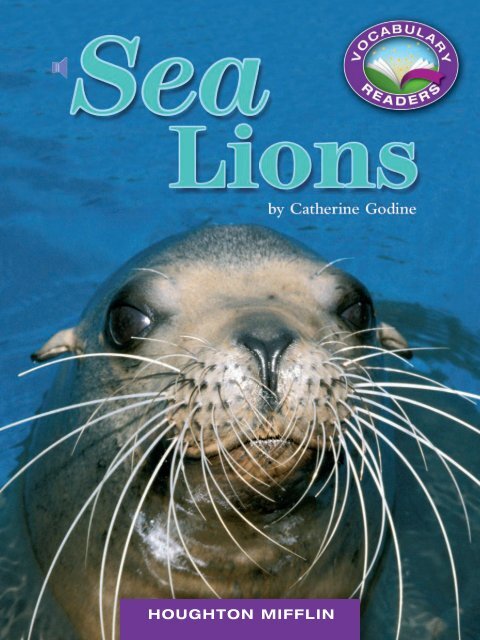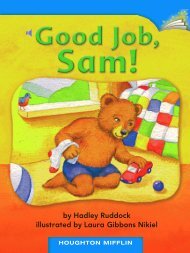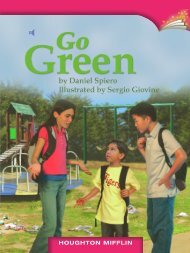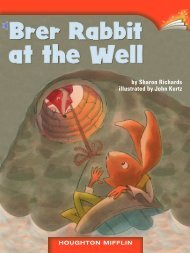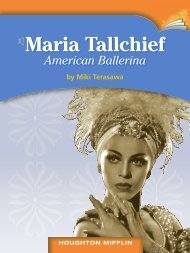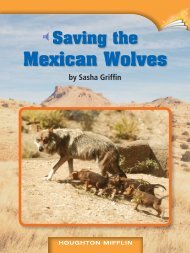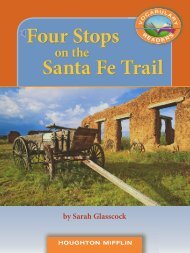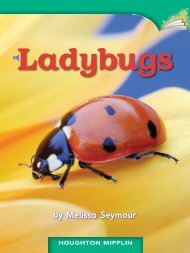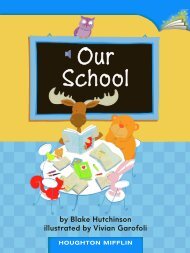Create successful ePaper yourself
Turn your PDF publications into a flip-book with our unique Google optimized e-Paper software.
HOUGHTON MIFFLIN
y Catherine Godine<br />
PHOTOGRAPHY CREDITS: Cover Jeff Rotman/Alamy. 1 © Norbert Wu/Minden Pictures. (bkgd) Siede Preis. 2 © Norbert<br />
Wu/Minden Pictures. 3 © Alistair Dove/Alamy. 4 © MITSUAKI IWAGO/Minden Pictures. 5 © MITSUAKI IWAGO/Minden<br />
Pictures. 6 (l) © Pete Oxford/Minden Pictures. (r) © SUZI ESZTERHAS/Minden Pictures. 7 Visual & Written SL/Alamy.<br />
8 © Frans Lanting/Minden Pictures. 9 © Visions of America, LLC/Alamy. 10 Jeff Rotman/Alamy.<br />
Copyright © by Houghton Mifflin Harcourt Publishing Company<br />
All rights reserved. No part of this work may be reproduced or transmitted in any form or by any means, electronic or<br />
mechanical, including photocopying or recording, or by any information storage and retrieval system, without the prior<br />
written permission of the copyright owner unless such copying is expressly permitted by federal copyright law. Requests<br />
for permission to make copies of any part of the work should be addressed to Houghton Mifflin Harcourt School Publishers,<br />
Attn: Permissions, 6277 <strong>Sea</strong> Harbor Drive, Orlando, Florida 32887-6777.<br />
Printed in China<br />
ISBN-13: 978-0-547-02186-7<br />
ISBN-10: 0-547-02186-0<br />
1 2 3 4 5 6 7 8 0940 18 17 16 15 14 13 12 11<br />
If you have received these materials as examination copies free of charge, Houghton Mifflin Harcourt School Publishers<br />
retains title to the materials and they may not be resold. Resale of examination copies is strictly prohibited.<br />
Possession of this publication in print format does not entitle users to convert this publication, or any portion of it, into<br />
electronic format.
Introduction<br />
If they are very lucky, visitors to the<br />
coast of California get a treat. They get<br />
to see sea lions.<br />
These noisy, playful animals swim<br />
in the bays of California. They swim<br />
alone or in groups. Sometimes they leap<br />
and dive in the water. They also float<br />
together in a group, looking like a large<br />
raft. They even ride the rippled waves<br />
like surfers.
Visitors aboard boats might see sea<br />
lions sleeping on islands. The sea lions<br />
rest with their noses pointing to the sky<br />
or lie stacked on top of one another on a<br />
large rock.<br />
Visitors can hear sea lions, too.<br />
<strong>Sea</strong> lions bark, honk, and trumpet to<br />
each other. Some even roar.<br />
Visitors to the coast of California see sea lions<br />
play and swim.
What Are <strong>Sea</strong> <strong>Lions</strong><br />
<strong>Sea</strong> lions are mammals. Mammals are<br />
warm-blooded animals with hair or fur.<br />
Female mammals produce milk to feed<br />
their young.<br />
<strong>Sea</strong> lions can grow to be 5 to 11 feet<br />
long. They can weigh from 77 to 2,00<br />
pounds.<br />
<strong>Sea</strong> lions have whiskers and fur, fins<br />
and flippers. They have large eyes to<br />
help them see underwater. Their teeth<br />
are sharp and pointed, good for catching<br />
and eating food.<br />
Male seal lions are much bigger than females.
eyes<br />
fur<br />
whiskers<br />
fins<br />
flippers<br />
<strong>Sea</strong> lions are great swimmers. They<br />
have a sleek body that’s perfect for<br />
moving through the water. Long flippers<br />
help them make powerful strokes while<br />
swimming. They can reach speeds of 25<br />
miles per hour for short periods. This<br />
helps them escape from their enemies.<br />
5
<strong>Sea</strong>l or <strong>Sea</strong> Lion<br />
How can you tell the difference<br />
between a sea lion and a seal Both<br />
are mammals, and both have flippers.<br />
Blubber keeps them warm during any<br />
cold ocean voyage. And both like to eat!<br />
<strong>Sea</strong> lions have small ear flaps. <strong>Sea</strong>ls<br />
have just a tiny opening through which<br />
they hear. And sea lions can rotate, or<br />
twist, their back flippers to help them<br />
scoot along when they are on land. <strong>Sea</strong>ls<br />
can’t rotate their flippers.<br />
<strong>Sea</strong> lions use their<br />
flippers to move on<br />
land. <strong>Sea</strong>ls can’t do this.
<strong>Sea</strong> lions dive and then surface like whales do.<br />
Where Do <strong>Sea</strong> <strong>Lions</strong> Live<br />
Many sea lions live in the waters of<br />
California. They also live in waters near<br />
Oregon and Washington and in Canada.<br />
<strong>Sea</strong> lions can dive down as far as 600<br />
feet in search of tasty food. They are<br />
mammals, though, so they cannot stay<br />
underwater forever. They must return to<br />
the surface to breathe.
<strong>Sea</strong> lions play on the rocks formed by lava from a<br />
volcano long ago.<br />
<strong>Sea</strong> lions can live on land too. They<br />
can be spotted on beaches, islands, or<br />
rocks near the coast. They spend most<br />
of their day sleeping on land. They also<br />
gather at marinas or wharves and rest on<br />
old anchors. At night they hunt for food.<br />
<strong>Sea</strong> lion pups are born on land. A<br />
few weeks after their arrival, they begin<br />
to learn to swim and fish.
How Smart Are <strong>Sea</strong> <strong>Lions</strong><br />
<strong>Sea</strong> lions are smart. They can be<br />
trained to toss objects in the air and<br />
catch them on their noses. They can be<br />
guided to perform these tricks on cue.<br />
<strong>Sea</strong> lions often perform at zoos<br />
and aquariums.<br />
Scientists study sea lions. They are<br />
interested in finding out how sea lions<br />
work together.<br />
<strong>Sea</strong> lions perform at many zoos and aquariums.
Are <strong>Sea</strong> <strong>Lions</strong> in Danger<br />
<strong>Sea</strong> lions were once hunted for their<br />
skin and oil. Many died. Now laws keep<br />
them safe from hunters.<br />
<strong>Sea</strong> lions are still in danger. Oil and<br />
garbage dumped in oceans by humans<br />
hurt them. But many people are working<br />
to keep them safe.<br />
10
Responding<br />
TARGET VOCABULARY Word Builder<br />
Make a web around the word bay. List<br />
animals you would see in bays. Copy the<br />
web and add words.<br />
sea lion<br />
bay<br />
Write About It<br />
Text to Self Describe a bay. Tell what<br />
animals you would see, and why you want<br />
to see them. Use words from the web.<br />
11
TARGET VOCABULARY<br />
aboard<br />
anchor<br />
arrival<br />
bay<br />
guided<br />
lava<br />
rippled<br />
spotted<br />
twisted<br />
voyage<br />
TARGET STRATEGY Question Ask questions<br />
before you read, as you read, and after you read.<br />
Remove the first letter and you can use<br />
this to build a house.<br />
12
Level: M<br />
DRA: 28<br />
Science<br />
Strategy:<br />
Question<br />
Word Count: 618<br />
3.5.<strong>24</strong> Build Vocabulary<br />
HOUGHTON MIFFLIN<br />
Online Leveled Books<br />
ISBN-13: 978-0-547-02186-7<br />
ISBN-10: 0-547-02186-0<br />
1032079


